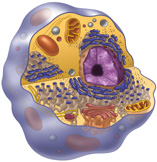|
Home
Cell Structure
and Function
Biomembranes
Photosynthesis
Cell
Respiration
DNA Structure
and Replication
Contacts
|
Cell Structure
and Function
Concept 3: Features of Eukaryotic Cells
Eukaryotic cells contain a
membrane-bound nucleus and numerous membrane-enclosed organelles
(e.g., mitochondria, lysosomes, Golgi apparatus) not found in
prokaryotes. Prokaryotic
cells are fundamentally different in their internal organization
from eukaryotic cells. Notably, prokaryotic cells lack a nucleus and
membranous organelles.
The nucleus is bounded by the
nuclear envelope, a double membrane with many nuclear pores through
which material enters and leaves. Animals, plants, fungi, and
protists are all eukaryotes. Eukaryotic cells are more complex than
prokaryotic cells and are found in a great many different forms.

  |